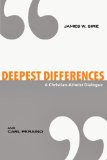 The book provides an opportunity to eavesdrop on a conversation between two educated individuals with many shared views and assumptions as well as a great many differences. Rather than offering an opportunity to settle disagreements between Christians and atheists, the book rather provides an opportunity to reflect on the nature of worldviews, the character of our assumptions and their openness or otherwise to being called into question, and what is involved in an attempt to dialogue with someone whose assumptions differ from one’s own.
The book provides an opportunity to eavesdrop on a conversation between two educated individuals with many shared views and assumptions as well as a great many differences. Rather than offering an opportunity to settle disagreements between Christians and atheists, the book rather provides an opportunity to reflect on the nature of worldviews, the character of our assumptions and their openness or otherwise to being called into question, and what is involved in an attempt to dialogue with someone whose assumptions differ from one’s own.
It is interesting to note that the dialogue began with Jim quoting an “argument for the existence of God” that ran as follows:
There is the music of Johann Sebastian Bach.
Therefore there must be a God.
You either see this one or you don’t.[p.17, quoting Catholic philosophers Peter Kreeft and Ron Tacelli of Boston College]
Jim more than once seemed to Carl to be too willing to appeal to divine inscrutibility. My own impression was similar and yet different. I often felt Jim was insufficiently willing to see the arbitrary point at which inscrutibility was invoked: it was inevitably where his own understanding of Biblical theism ran out of specifics (see pp.127-130). In my own view, just as Jim apologized for engaging in speculation, he ought to have acknowledged that some elements of the Biblical authors’ or classic Christian theology’s views are equally speclative, speaking with confidence where we today might better humbly acknowledge uncertainty (see pp.61-66).
Jim mentioned at times his confidence in the Bible’s essential historicity. Since that never became the focus of the conversation, differing assumptions on this matter were a hurdle which persisted throughout the exchange. But this is simply one facet of what was a conversation between one particular Christian and one particular atheist. Although some will read the book as though spectators at a boxing match, cheering for one side, I expect that many Christians and atheists who read the book will see places where they themselves would have argued the same point differently or even have agreed with their dialogue partner.
A key starting point to the dialogue was the question of the need for a supernatural ground for morality. This was one place where I would have disagreed with both sides. Against Carl, I would have said that morality for reflective humanity is no longer simply a matter of evolution and survival via natural processes. The is/ought problem Jim highlighted is an important one. Yet I disagree with Jim that one can simply resolve the matter by positing God, for two main reasons. First, such a move makes a problematic leap: there is a sense of absolute right and wrong, therefore an entity must exist that justifies such a moral sense. It is interesting that Christians have been known to invoke God as the basis for our moral sense while at the same time claiming our human moral sense is fundamentally skewed. Likewise, Biblical theism cannot justify precisely the kind of absolute morality that Jim claims it can, since the Bible depicts God demanding a child be sacrificed (in a story that makes no sense unless read with the assumption that God could indeed demand such a thing) and the slaughter of every last inhabitant of a city – precisely the sort of thing many Christians appeal to as an example of things that are “always absolutely wrong without exception” only if God exists (pp.57-58).
While reading the exchange I was struck by a paradoxical (at least to my mind) element of the Evangelical worldview. On the one hand, much is made of the inability of any system other than Biblical theism to ground morality. But then, ironically, Evangelicals turn around and respond to questions about moral atheists by asserting that morality is not ultimately what God is interested in when it comes to the salvation of human beings. There is a tension here that often remains unnoticed, whereas it deserves some serious thought and explanation.
In the course of the conversation many interesting questions come up. One example is the question of why God created, and whether, if in the afterlife it will be impossible for anyone to sin, it would not have made more sense for God to have made humans incapable of sin from the outset. Yet such creatures being created at all seems to have nothing desirable about it that might motivate God to create in the first place. Jim, as a conservative Christian, is unwilling to consider other options that are alternatives to both his view and Carl’s atheism, namely moderate and liberal Christian views that accept that some elements of the claims of Biblical authors and Christian tradition and theology may need to be rethought, and either revised or repudiated.
I highly recommend this book by Sire and Peraino to anyone who values dialogue with those whose views differ from their own. The book contains a study guide, but I would advise against the use of this volume by Christians or atheists, which might lead to precisely the sort of smug self-congratulatory outlook or opponent-bashing the book eschews. Rather, the book better serves as a starting point for other conversations similar to that between its two authors.












